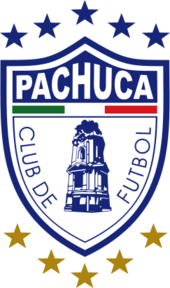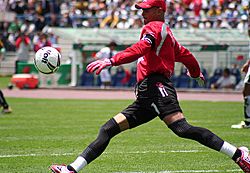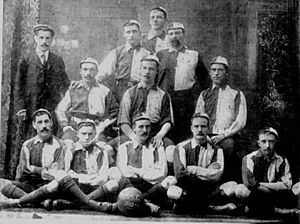C.F. Pachuca facts for kids
 |
|||
| Full name | Club de Fútbol Pachuca | ||
|---|---|---|---|
| Nickname(s) | Tuzos (Gophers) | ||
| Short name | PAC, CFP | ||
| Founded | 1 November 1892, as Pachuca Football Club 1960, refounded as Club de Fútbol Pachuca |
||
| Stadium | Estadio Hidalgo | ||
| Stadium capacity |
25,922 | ||
| Owner | Grupo Pachuca | ||
| Chairman | Armando Martínez Patiño | ||
| Head coach | Jaime Lozano | ||
| League | Liga MX | ||
| Clausura 2025 | Regular phase: 8th Final phase: Quarterfinals |
||
|
|
|||
Club de Fútbol Pachuca is a professional football club from Pachuca, Hidalgo, Mexico. They play in Liga MX, which is the top football league in Mexico.
The club started in 1892 as Pachuca Football Club. It was founded by British miners who came to Mexico for work. These miners were the first to bring football to Mexico! Pachuca is known as "Tuzos" (Gophers), which honors the city's mining past. It was the very first football club in Mexico and helped start the first amateur football league.
After some years moving between different leagues, Pachuca joined Mexico's top division in 1998. Since then, they have become one of Mexico's most successful teams. They have won 7 Liga MX titles, 6 CONCACAF Champions Cup titles, and even the 2006 Copa Sudamericana. They also won the 2007 North American SuperLiga, the FIFA Derby of the Americas, and the FIFA Challenger Cup.
Contents
- Club History: How Pachuca Started
- Pachuca's Golden Era: Winning Big (1999–2010)
- Recent Successes
- Team Identity: Crest and Colors
- Home Grounds: Pachuca's Stadiums
- Team Leaders and Players
- Player Records: Top Scorers and Appearances
- Club Records and Statistics
- Honors: Pachuca's Trophies
- Images for kids
- See also
Club History: How Pachuca Started
Early Days: Pachuca FC (1892–1895)
Football began in Pachuca thanks to British miners from Cornwall, England. They worked for the Compañía Real del Monte y Pachuca mining company. In their free time, they played football for fun. Francis Rule and Alfred C. Crowle helped create the first official football club in Mexico. It was called Pachuca Football Club and started on November 1, 1892.
The game quickly became popular. Soon, other clubs formed in nearby cities like Orizaba and Mexico City.
Pachuca AC: Growing the Club (1895–1922)
In 1895, Pachuca FC joined with other local sports clubs. They changed their name to Pachuca Athletic Club. This new club allowed players to enjoy football and other sports.
In 1902, Pachuca AC helped create the Liga Mexicana de Football Amateur Association. This was Mexico's first amateur football league. Pachuca AC won its first league title in the 1904–05 season. They also won the Copa Tower twice. By 1915, most of the players were Mexican, and the team won two more amateur league titles.
The club faced tough times between 1920 and 1921 because of the Mexican Revolution. Many players moved away, and the club eventually closed down in 1922. It stayed closed for 28 years.
CF Pachuca: A New Beginning (1960–Present)
Pachuca returned in 1950 as a founding member of the Segunda División de México. However, the club closed again in 1952.
Finally, in 1960, the club was restarted with its current name, Club de Fútbol Pachuca. They also changed their team colors from black and white to the blue and white they use today.
In the 1966–67 season, Pachuca won the Segunda División and moved up to the top league, the Primera División de México. Their first game in the top league was a 1–3 loss to Necaxa in 1967. But they got their first win on July 16, 1967, beating Monterrey 2–1 at home.
Pachuca stayed in the top division until 1973, when they were relegated for the first time. They returned to the Primera División in 1992 but were relegated again the next year. After another promotion and relegation, Pachuca finally returned to the top league in 1998. They have stayed there ever since!
Pachuca's Golden Era: Winning Big (1999–2010)
This period is known as Pachuca's "golden era" because they won many titles. They claimed 11 trophies in 11 years! This included 5 league titles and 4 CONCACAF titles.
Their first league title came in the Invierno 1999 tournament. Under coach Javier Aguirre, Pachuca beat Cruz Azul 3–2 in the finals. The winning goal was scored by Alejandro Glaria in extra time.
Pachuca then started playing in international tournaments. They finished third in the 2000 CONCACAF Champions' Cup. In 2001, they won their second league title, beating Tigres UANL.
On September 18, 2002, Pachuca won their first international trophy: the 2002 CONCACAF Champions' Cup. They defeated Monarcas Morelia 1–0 in the final.
In Apertura 2003, Pachuca won another league title, again against Tigres UANL. In Clausura 2006, they won their fourth league title, beating Club San Luis 1–0. This was the first time they won the league title at their home stadium.
Making History: Copa Sudamericana 2006

Winning the Clausura 2006 title allowed Pachuca to play in the 2006 Copa Sudamericana. This was a big South American tournament. Pachuca played very well, beating teams from Argentina and Brazil. In the final, they faced Colo-Colo from Chile. The first game in Mexico was a 1–1 draw. In the second game in Chile, Pachuca won 3–2 overall.
This victory was historic! Pachuca became the first Mexican and CONCACAF club to win a CONMEBOL continental club competition. They were also the only club in the world to win an official title from a confederation outside their own.
Pachuca continued their winning streak. They won the 2007 CONCACAF Champions' Cup by beating Guadalajara. On May 27, 2007, they won their fifth league title in the Clausura 2007, defeating América. This meant Pachuca had won four major trophies in just 15 months!
They won the CONCACAF Champions Cup again in 2008 and the 2007 North American SuperLiga in August 2007. CONCACAF even named Pachuca the "2007 Team of the Year" for winning five titles in 17 months. Pachuca won their fourth CONCACAF title in the 2009–10 CONCACAF Champions League, securing a spot in the 2010 FIFA Club World Cup.
Recent Successes
After nine years without a league title, Pachuca won their sixth title on May 29, 2016, in the Clausura 2016 tournament. They beat Monterrey 2–1. The next year, Pachuca won their fifth CONCACAF Champions League title, defeating Tigres UANL. This earned them a spot in the 2017 FIFA Club World Cup, where they finished third.
Six years later, Pachuca won their seventh league title on October 30, 2022, in the Apertura 2022 tournament. They beat Toluca with a huge 8–2 score over two games, scoring the most goals ever in a Liga MX final.
Pachuca won the 2024 CONCACAF Champions Cup final for the sixth time, beating Columbus Crew 3–0. This win qualified them for the first FIFA Intercontinental Cup and the 2025 FIFA Club World Cup.
2024 FIFA Intercontinental Cup Achievements
Pachuca was the first Mexican and CONCACAF team to play in the 2024 FIFA Intercontinental Cup. They won the FIFA Derby of the Americas by beating Botafogo 3–0. Then, they won the FIFA Challenger Cup by defeating Al Ahly in a penalty shootout. This made them the first Mexican and CONCACAF club to win an international title directly organized by FIFA. They finished as runners-up in the main FIFA Intercontinental Cup, losing to Real Madrid.
Team Identity: Crest and Colors
The club's crest features its traditional blue and white colors. In the center, you can see the Monumental Clock of Pachuca. This clock is a famous landmark in the city, built to celebrate 100 years of Mexico's independence.
Originally, the club used black and white colors from 1902 to 1920. In the early 1960s, they switched to the blue and white combination, which they still use today. Sometimes, they also use black, orange, and different shades of blue for their uniforms. The black, orange, and white combination became popular for away games after Pachuca won the 2006 Copa Sudamericana wearing those colors.
Home Grounds: Pachuca's Stadiums
Pachuca has played in several stadiums over the years.
Their first football field was the Campo del Ferrocarril de La Maestranza. This was located behind the city's old railway station.
When the club returned in 1950, they played at the Estadio Margarito Ramírez, a smaller field.
After the club was restarted in 1960, they moved to the Estadio Revolución Mexicana. This stadium had over 3,000 seats and was their home from 1960 to 1993. They won two promotions to the top division while playing there.
Since 1993, Pachuca's home has been the Estadio Hidalgo. This stadium can hold 25,922 fans. It's where Pachuca has had its most successful period, winning 8 titles at home (3 Liga MX titles and 5 CONCACAF titles).
Team Leaders and Players
Management Team
| Role | Person |
|---|---|
| Chairman | |
| Director of football | |
| Coordinator of football | |
| Director of academy |
Coaching Staff
First-Team Squad
|
|
Players on Loan
|
|
Player Records: Top Scorers and Appearances
Top Scorers in Liga MX
Here are some of the players who have scored the most goals for Pachuca in the Liga MX:
| No. | Player | Goals |
|---|---|---|
| 1 | 63 | |
| 2 | 61 | |
| 3 | 53 | |
| 4 | 49 | |
| 5 | 45 |
Most Appearances for Pachuca
These players have played the most games for Pachuca:
| No. | Player | Appearances |
|---|---|---|
| 1 | 395 | |
| 2 | 351 | |
| 3 | 331 | |
| 4 | 315 | |
| 5 | 307 |
Club Records and Statistics
Liga MX Highlights
- Seasons in Top Division: 63 seasons.
- First Game: A 1–3 loss against Necaxa on July 6, 1967.
- First Win: A 2–1 victory against Monterrey on July 16, 1967.
- Biggest Win: A huge 9–2 victory against Veracruz in April 2019.
- Biggest Defeat: Losing 0–5 to Tigres UANL in September 2011, Cruz Azul in March 2018, and Monterrey in January 2019.
- Most Points in a Season: 39 points in Clausura 2007.
- Most Goals Scored in a Season: 42 goals in 17 matches in Clausura 2009.
International Competition Highlights
- First International Game: A 0–1 loss to Emelec from Ecuador in July 2000.
- Biggest Win: An amazing 11–0 victory against Police United from Belize in September 2016.
- Biggest Defeat: Losing 0–4 to Olimpia from Honduras in January 2001, Boca Juniors from Argentina in April 2005, and Internacional from Brazil in June 2007.
Honors: Pachuca's Trophies
Pachuca has won many important titles throughout its history:
National Titles
| Type | Competition | Titles | Winning editions | Runners-up |
|---|---|---|---|---|
Top division |
Primera División/Liga MX | 7 | Invierno 1999, Invierno 2001, Apertura 2003, Clausura 2006, Clausura 2007, Clausura 2016, Apertura 2022 | Verano 2001, Clausura 2009, Clausura 2014, Clausura 2022 |
| Copa MX | 0 | – | Apertura 2017 | |
| Campeón de Campeones | 0 | – | 2004, 2006, 2016, 2023 | |
| Promotion divisions | Primera División A | 2 | 1995–96, Invierno 1997 | 1994–95 |
| Campeón de Ascenso | 1 | 1998 | – | |
| Segunda División | 2 | 1966–67, 1991–92 | 1984–85, 1985–86, 1990–91 | |
| Copa de la Segunda División | 2 | 1963–64, 1965–66 | – | |
| Campeón de Campeones de la Segunda División | 0 | – | 1966, 1967 |
International Titles
| Type | Competition | Titles | Winning editions | Runners-up |
|---|---|---|---|---|
| FIFA Intercontinental Cup | 0 | – | 2024 | |
| FIFA Challenger Cup | 1 | 2024 | – | |
| FIFA Derby of the Americas | 1 | 2024 | – | |
Continental CONCACAF |
CONCACAF Champions Cup/Champions League | 6 | 2002, 2007, 2008, 2009–10, 2016–17, 2024 | – |
| Continental CONMEBOL | CONMEBOL Sudamericana | 1 | 2006 | – |
| CONMEBOL Recopa | 0 | – | 2007 |
Regional Titles
| Type | Competition | Titles | Winning editions | Runners-up |
|---|---|---|---|---|
Liga MX |
North American SuperLiga | 1s | 2007 | – |
- Notes
- record
- s shared record
Amateur Titles
- Liga Mexicana de Football Amateur Association: 1904–05, 1917–18, 1919–20
- Copa Tower: 1907–08, 1911–12
Friendly Titles
- Copa Pachuca: 2000, 2004, 2009, 2011, 2013-V, 2014
- Trofeo Reino de Navarra: 2002
- Carlsberg Cup: 2008
- Copa Amistad: 2008
- Rematch Cup: 2021
- Copa por la Paz: 2024
- Challenge Super Cup: 2025
Images for kids
See also
 In Spanish: Club de Fútbol Pachuca para niños
In Spanish: Club de Fútbol Pachuca para niños
- C.F. Pachuca Reserves and Academy
- C.F. Pachuca Premier
- Atlético Pachuca
- Pachuca Club records
- C.F. Pachuca (women)
 | Kyle Baker |
 | Joseph Yoakum |
 | Laura Wheeler Waring |
 | Henry Ossawa Tanner |




